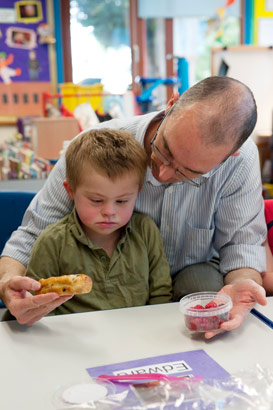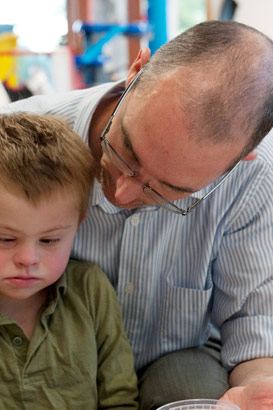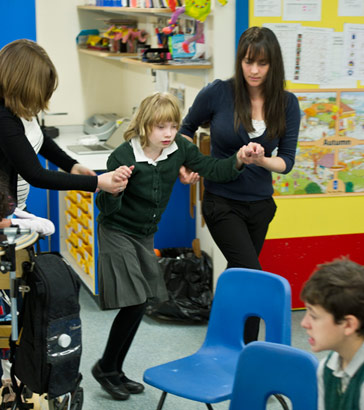
Some parents leave grief behind...but they may have periods of recurring distress. One explanation for this is the 'Chronic sorrow model' (Olshansky, 1962). This model has had various phases of popularity, and...even this century (Roll-Pettersson, 2001) it has been the subject of some debate.
The parent who continues to feel sadness about a child's disability can
still be confident and caring, but their state of mind may affect the way they respond to professionals. This has been described
as a state of 'constant vulnerability' (Carpenter, 1997) which may manifest itself in hypersensitivity, short temper and an
inability to cope with criticism of their child or themselves. For the parent, such responses may be symptomatic of the dread
of further unanticipated bad news or the desire to protect their child in the face of a social structure whose capacity to
care for that child is being continually eroded.
Carpenter, 2007

I brought home a baby, not a syndrome.
Espe-Sherwindt, 2005
I often dread picking my son up from school to be informed of his antics.
I will dutifully go through the motions of discussing his behaviour with him and the teacher, but really I feel very sad for
him because it is not all his fault. The teachers do not understand that sometimes he just cannot help his behaviour. He is
definitely wired differently to his peers!
Ricks, 2010

I think the big problems for me tend to change. In the first six months
it was just coping with Lisa. She was such a difficult baby. Then not wanting to look towards the future with her...or thinking
of any type of future really for her. But now, I wouldn't say the emotional side of it. I've accepted Lisa for what she is
and I love her for what she is...Now I find that I just seem to be fighting everybody and everything to get what is right
for Lisa. And that is the battle now. Dealing with people and standing up for what you think is right, what she should be
having.
Beresford, 1994
Eventually, when Jayne reached 12 years of age, the strain on us as a
couple proved too great and she went into care. Even today I still feel the guilt, sadness and pain that as a mother I had
let her down, and could no longer look after my own daughter. I feel strongly that had we received appropriate support and
help we could have had Jayne with us for a few more years and remained together as a family. That sense of loss when Jayne
went into care felt like a bereavement and has never gone away. Although Jayne came home to stay most weekends it was never
the same.
Babb, 2007

Consider the families of the children you work with and their relationship with the school.
Recall situations where there might have been difficulties and misunderstandings. It is easy to interpret these from the professional perspective.
Take one example – either from your own experience or one that you have heard about – and reframe it from the family's point of view, their pressures and concerns.

Babb, C. (2007) Living with shattered dreams: a parent's perspective of living with learning disability, Learning Disability Practice, 10 (5), 14-18.
Beresford, B. (1994) Positively Parenting: Caring for a severely disabled child, London: Social Policy Research Unit, HMSO.
Carpenter, B. (2007) 'Family structures'. In: Early Support (ed.) Working in Partnership through Early Support: Distance learning text, London: Early Support.
Carpenter, B. (ed.) (1997) Families in Context: Emerging trends in family support and early intervention, London: David Fulton.
Espe-Sherwindt, M. (2005) Another look at ‘coaching’ families: from theory to real life!', Paper given to 'Good Practices in Early Intervention' Conference, University of Coimbra, Portugal (November).

Meyer, D.J. (ed.) (1995) Uncommon Fathers: Reflections on raising a child with a disability, Bethesda, MD: Woodbine House.
Olshansky, S. (1962) Chronic sorrow: a response to having a mentally defective child, Social Casework, 43, 190-193.
Ricks, S. (2010) Case study: a mother's experience 1. In: Carpenter, B. (2010) The Family Context, Community and Society, London: Specialist Schools and Academies Trust (now The Schools Network).
Roll-Pettersson, L. (2001) Parents talk about how it feels to have a child with a cognitive disability, European Journal of Special Needs Education, 16 (1), 1-14.